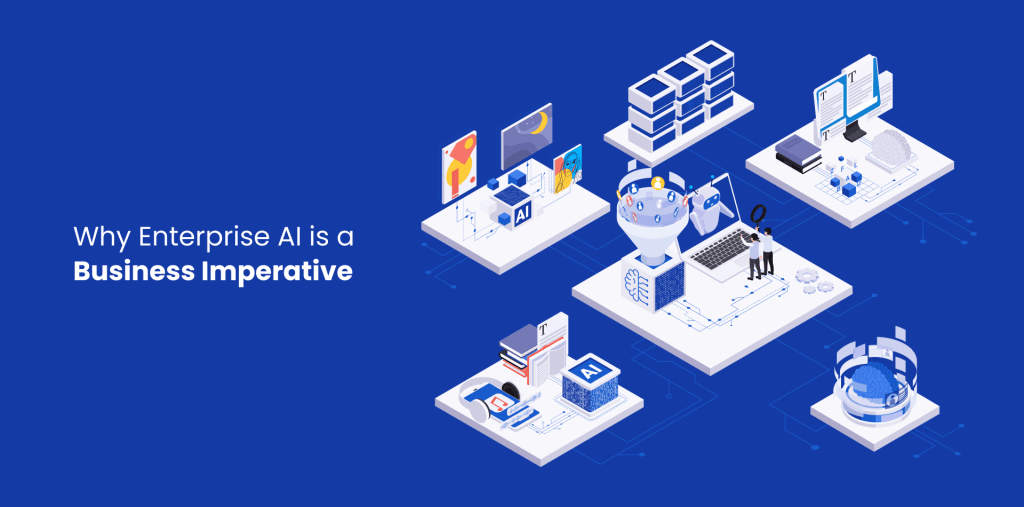Last Updated on –
AI
Enterprise AI: How Leading Companies Are Using AI to Reshape the Future of Business

What is Enterprise AI?
- Scale – Built to handle massive datasets from multiple systems.
- Integration – Works seamlessly with ERP, CRM, and other core enterprise software.
- Compliance – Adheres to strict regulatory and security standards.
- Mission – Critical Application – Supports decisions and processes that directly impact business continuity.
Why Enterprise AI is a Business Imperative
- Operational Efficiency at Scale – Automating repetitive and time-consuming processes allows professionals to focus on higher-value work.
- Predictive Intelligence – Machine learning models can forecast demand, detect anomalies in operations, and prevent system failures before they occur.
- Data-Driven Decision-Making – Enterprise AI converts large volumes of unstructured data into actionable insights in real time.
- Customer-Centric Personalization – AI enables tailored product recommendations, targeted marketing campaigns, and responsive customer service.
- Cost Reduction and Revenue Growth – Streamlined processes lead to lower operational costs while enabling new revenue opportunities.
Real-World Examples of Enterprise AI Success
1. Siemens – Predictive Maintenance for Industry 4.0
Pfizer applies Enterprise AI in its R&D division to analyze millions of molecular structures and identify promising drug candidates. By simulating potential interactions digitally, AI reduces the time needed to move from research to clinical trials. This not only speeds up the delivery of new treatments but also cuts costs in pharmaceutical development.
Challenges in Implementing Enterprise AI
- Data Integration and Quality – Many enterprises have siloed and unstructured data that must be cleaned and connected before AI can deliver value.
- Cultural Resistance – Employees might be reluctant to rely on AI-based suggestions or change their usual ways of working.
- High Initial Investment – Building AI infrastructure, training personnel, and integrating systems involves considerable initial investment.
- Regulatory and Ethical Concerns – AI must comply with privacy regulations, ensure fairness, and provide transparency in decision-making.
Best Practices for Enterprise AI Success
- Identify High-Impact Use Cases – Focus on business problems where AI can deliver measurable ROI quickly.
- Prepare Data Infrastructure – Ensure data is accurate, well-structured, and easily accessible.
- Build Cross-Functional Teams – Collaboration between IT, data science, compliance, and business units ensures alignment.
- Choose Scalable AI Platforms – Choose a technology that can scale with your business growth.
- Continuously Measure and Improve – Track performance metrics, refine models, and adapt strategies.
The Future of Enterprise AI
Conclusion
FAQ’S
Enterprise AI is designed for large-scale, mission-critical business operations. Unlike consumer AI tools meant for individuals, it integrates with core enterprise systems like ERP and CRM, handles massive datasets, complies with strict regulations, and supports thousands of users and millions of transactions daily.
Success begins by focusing on high-impact, measurable use cases, establishing a solid data foundation, creating cross-functional teams, choosing scalable AI platforms, and consistently monitoring and refining AI models to stay aligned with business objectives.
Enterprise AI will become an integral part of everyday business operations across functions – supply chain, marketing, HR, finance, and customer support. Early adopters will enjoy faster innovation cycles, improved customer relationships, and greater adaptability to market changes, while late movers risk losing competitive ground.
